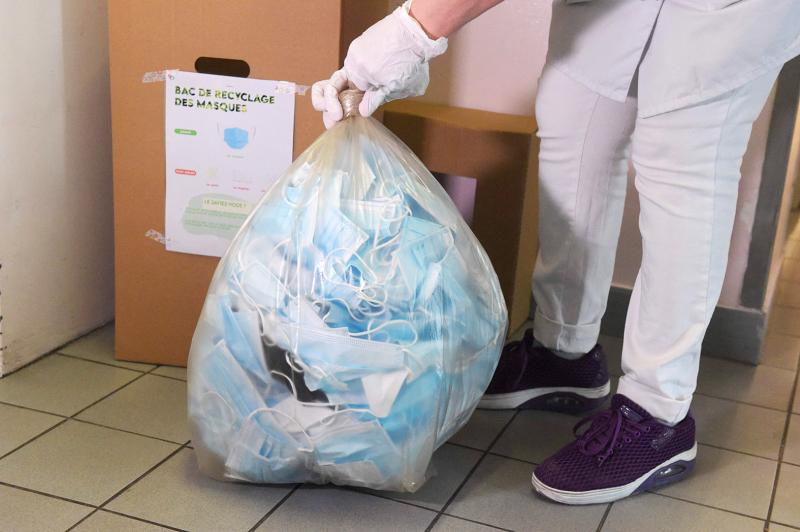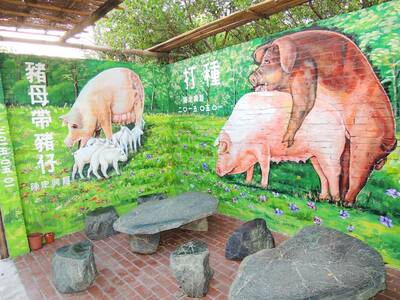Researchers in Australia want to transform single-use masks into road material. In the US, the protective gear is recycled into benches. And in France, they are reborn as floor carpets for cars.
Used to curb the spread of COVID-19, masks are exacerbating another pandemic: plastic pollution.
Around 129 billion disposable masks are used every month around the world, according to the American Chemical Society.

Photo: AFP
Made out of polypropylene plastic material, elastic and metal, used masks are usually thrown out in garbage bins, destined for landfills, or incinerated.
They are also littering streets, rivers and oceans, harming wildlife.
But researchers and companies are looking for ways to put masks to good use, though it is not a very profitable venture at the moment.
In Britain, several hospitals have acquired a compactor made by Cardiff-based Thermal Compaction Group which melts protective gowns and surgical masks into blue slabs.
The material is then used to make garden chairs or tables.
In France, Tri-o et Greenwishes, a recycling company, picks up masks tossed in special bins used by some 30 customers, including Parisian hospitals, TV network TF1 and building materials giant Saint-Gobain.
“We had a lot of demand from our clients” to offer mask recycling services, said company president Matthieu de Chanaleilles.
The company charges fees starting at US$300 per month to collect the trash.
At its recycling plant, staff wearing protective gear stand behind plexiglass to sort through paper tissues, gloves and cups that are thrown in mask bins by accident. Afterward, the workers are sprayed down with disinfectant.
The sorting area is sterilized with ultraviolet lamps. Masks are kept in quarantine for a week before being handled. Two companies based in northern France then shred the masks, disinfect them and extract the polypropylene, which is transformed into pebbles that are used to make floor carpets or other plastic parts in a car.
Tri-o et Greenwishes has recycled one tonne of masks so far and hopes to have processed 20 tonnes by the end of the year.
It’s a drop in the ocean of masks.
Some 40,000 tonnes of masks were binned in France last year, without a recycling option, according to a January parliamentary report.
Making the venture profitable is a challenge.In Trenton, New Jersey, TerraCycle sells a “zero waste box” for disposable masks for US$88.
The masks are then sent to partner facilities to be recycled into plastic granules that are sold to manufacturers that make other products such as benches, flooring surfaces or shipping pallets.
TerraCycle chief executive Tom Szaky said recycling personal protective equipment is costlier than aluminium.
“Why is, say for example, a dirty diaper, or PPE not recyclable? It’s because it costs much more to collect and process and the results are worse. So no one would bother doing it because there’s no money to be made,” Szaky said.
“So Terracycle’s business says ‘Well, if someone’s willing to pay those actual costs, then we can perform such a service’,” he said.
In Australia, researchers at the Royal Melbourne Institute of Technology are experimenting with other solutions after being inspired by the sight of masks littering the streets.
Once disinfected and shredded, masks can be mixed with processed building rubble to create a flexible and robust material to help build roads, according to the scientists.
The researchers are now investigating their use in construction cement. Three million masks are need to make 1km of road.
“The facemasks have a good tensile strength; they can provide tensile strength to the concrete, which is very important,” Mohammad Saberian, a post-doctoral research fellow at RMIT University, said.
“We’re currently looking for partners to use the face masks in real-world applications and to make kind of a pilot road,” Saberian said.
Since publishing the research earlier this year, several industries have expressed interest, and the team was now applying for funding to further investigate the findings, which could take one to two years, he said.

May 6 to May 12 Those who follow the Chinese-language news may have noticed the usage of the term zhuge (豬哥, literally ‘pig brother,’ a male pig raised for breeding purposes) in reports concerning the ongoing #Metoo scandal in the entertainment industry. The term’s modern connotations can range from womanizer or lecher to sexual predator, but it once referred to an important rural trade. Until the 1970s, it was a common sight to see a breeder herding a single “zhuge” down a rustic path with a bamboo whip, often traveling large distances over rugged terrain to service local families. Not only

Ahead of incoming president William Lai’s (賴清德) inauguration on May 20 there appear to be signs that he is signaling to the Chinese Communist Party (CCP) and that the Chinese side is also signaling to the Taiwan side. This raises a lot of questions, including what is the CCP up to, who are they signaling to, what are they signaling, how with the various actors in Taiwan respond and where this could ultimately go. In the last column, published on May 2, we examined the curious case of Democratic Progressive Party (DPP) heavyweight Tseng Wen-tsan (鄭文燦) — currently vice premier

The last time Mrs Hsieh came to Cihu Park in Taoyuan was almost 50 years ago, on a school trip to the grave of Taiwan’s recently deceased dictator. Busloads of children were brought in to pay their respects to Chiang Kai-shek (蔣中正), known as Generalissimo, who had died at 87, after decades ruling Taiwan under brutal martial law. “There were a lot of buses, and there was a long queue,” Hsieh recalled. “It was a school rule. We had to bow, and then we went home.” Chiang’s body is still there, under guard in a mausoleum at the end of a path

Last week the Directorate-General of Budget, Accounting and Statistics (DGBAS) released a set of very strange numbers on Taiwan’s wealth distribution. Duly quoted in the Taipei Times, the report said that “The Gini coefficient for Taiwanese households… was 0.606 at the end of 2021, lower than Australia’s 0.611, the UK’s 0.620, Japan’s 0.678, France’s 0.676 and Germany’s 0.727, the agency said in a report.” The Gini coefficient is a measure of relative inequality, usually of wealth or income, though it can be used to evaluate other forms of inequality. However, for most nations it is a number from .25 to .50